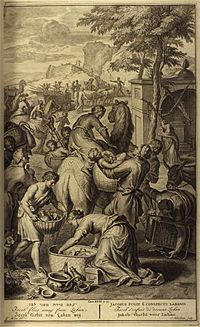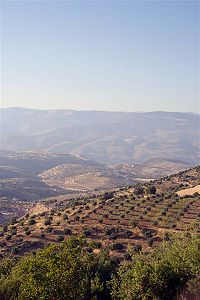Rachel
- This article is about the Biblical character. For other uses of the term, see Rachel (disambiguation).
Rachel (Hebrew: רחל, also spelled Rachael) "Ewe," also "innocence and gentility of a rose" and may mean "lovely." Standard Hebrew Raḥel, Tiberian Hebrew Rāḫēl, Rāḥēl) is the second and favorite wife of Jacob and mother of Joseph and Benjamin, first mentioned in the Book of Genesis of the Hebrew Bible. She is the daughter of Laban and the younger sister of Leah, Jacob's first wife. Jacob was her first cousin, as Jacob's mother Rebekah was Laban's sister.
Background
In the Biblical account, Jacob travels to the hometown of Laban—-the brother of his mother Rebekah—-to avoid being killed by his brother Esau, and also to find a wife. He encounters Rachel at a well used to water the local flocks, where she is tending her father's sheep. He assists her by rolling a stone away from the mouth of the well and, being her close kinsman, kisses her and begins to weep. She immediately informs her father of his arrival. Welcomed by Rachel's father, Laban, Jacob spends the month working with the family, after which Laban invites him to negotiate over the question of his wages. Here, Rachel is described as "lovely in form, and beautiful," and we are told that "Jacob was in love with Rachel" (Gen. 29:17-18)
Jacob offers to work for Laban for seven years in exchange for the right to marry Rachel. After the seven years are over, Laban hosts a wedding feast in Jacob's honor, but switches Rachel for Leah—probably through the ruse of a veil—and it is thus Leah who spends the wedding night with Jacob. Laban justifies himself on the grounds that it is uncustomary to give the younger daughter in marriage before the older one (Genesis 29:16-30). He offers to give Rachel to Jacob as a second wife in return for another seven years of work. Jacob accepts, spending the week with Leah exclusively and then marrying Rachel as well. Along with each daughter, Laban also sent two handmaids as their servants.
Motherhood
In the early years of the sisters' marriage, it is obvious that Jacob loves Rachel more than Leah. However, like several other providential women of the Bible, including Jacob's own mother Rebekeh, she remains childless for many years. God sympathizes with Leah, however, and gives her four sons in quick succession. These are Reuben, Simeon, Levi, and Judah (Genesis 29:31-35).
Rachel, seeing that she is still unable to conceive, offers her handmaid Bilhah as a third wife to Jacob. She names and raises the two sons—Dan and Napthali that Bilhah bears. Rachel claims the sons as her own, saying of Dan ("vindication"): "God has vindicated me; he has listened to my plea and given me a son." On the birth of Napthali ("my struggle"), she declares: "I have had a great struggle with my sister, and I have won." (Gen. 30:4-7) Leah responds by offering her handmaid Zilpah as a fourth wife to Jacob. She names and raises the two sons—Gad and Asher that Zilpah bears.
The text relates a poignant story demonstrating the tension between Jacob's two primary wives, as well as Rachel's sense of urgency over her apparent infertility. Leah's firstborn, Reuben, returns from the field with mandrakes for his mother. Rachel, believing the roots will solve her fertility problem, asks for some of the roots. Leah responds angrily: "Wasn't it enough that you took away my husband? Will you take my son's mandrakes too?" (Gen 30:15) Rachel offers to trade her scheduled night with their husband in return for the mandrakes. Leah agrees, and that night she conceives Issachar, and she later gives birth to Zebulun. Finally, after six males, Leah finally gives birth to a daughter, Dinah.
After this, at long last, God "remembers" Rachel and gives her a son of her own, Joseph. At his birth, Rachel declares: "God has taken away my disgrace."
Journey to Canaan
During all this time, about 14 years, Rachel and her growing family still lived on Laban's land. Even after this, Laban still insisted on another seven years labor from him. During this time Rachel's husband became a wealthy man, amassing large flocks of sheep and goats. In the twenty-first year, however, God called Jacob to return to Canaan. Jacob sent for Rachel and Leah and shared God's revelation with them. Jacob describes God as telling him, "I am the God of Bethel, where you anointed a pillar and where you made a vow to me. Now leave this land at once and go back to your native land." (Gen. 31:12-13)
Jacob instructed them to get ready to depart immediately, knowing that Laban would accuse him of theft and breaking their agreement. Rachel and Leah replied willingly united with Jacob's plan, saying:
Do we still have any share in the inheritance of our father's estate? Does he not regard us as foreigners? Not only has he sold us, but he has used up what was paid for us. Surely all the wealth that God took away from our father belongs to us and our children. So do whatever God has told you. (Gen 31:14-15)
Leah quickly gathered her children and belongings and joined Jacob—together with Joseph and the slaves—to leave for Canaan. The families apparently did not live in immediate proximity, for only after three days does Laban realize the large caravan—not to mention his daughters and grandchildren—had gone. He did not overtake the group until they had reached the hill country of Gilead, to the east of the Jordan River.
Although the scene is ripe for bloodshed, it is said that God spoke to Laban and warned him not to harm Jacob. A tense drama unfolded as Laban searched for his precious household images which Rachel had stolen from him, but they are not discovered. Finally, Laban offers a covenant of peace between him and Jacob, saying:
- The women are my daughters, the children are my children, and the flocks are my flocks. All you see is mine. Yet what can I do today about these daughters of mine, or about the children they have borne? Come now, let's make a covenant, you and I, and let it serve as a witness between us. (Gen. 31:43-44)
Jacob agrees to the covenant of peace, indicating an ancient religious bond between him and Laban going back to the time of their grandfather Terah, saying: "May the God of Abraham and the God of Nahor, the God of their father, judge between us." Jacob set up a sacred pillar to commemorate the meeting and mark a boundary between his lands and Laban's. They share a sacrificial feast. Leah and her children, together with Rachel and Joseph, then kiss their father goodbye for the last time.
Death and burial
Rachel died in childbirth on the eleventh day of the Hebrew month of Heshvan,[1] and was buried by Jacob on the road to Efrat, just outside Bethlehem.[2] It is clear from the text of the Bible that Rachel died while having a breech baby. The midwife tells her in the middle of the birth that her child is a boy.[3] Today Rachel's Tomb, located between Bethlehem and the Jerusalem neighborhood of Gilo, is visited by thousands of visitors each year.[4]
Rachel's offspring
Rachel's son, Joseph, is destined to be the leader of Israel's tribes between exile and nationhood. This is exemplified in the Biblical story of Joseph, who prepared the way in Egypt for his family's exile there,[5] and in the future figure of Mashiach ben Yosef (Messiah, son of Joseph), who will fight the apocalyptic Wars of Gog and Magog, preparing the way for the kingship of Mashiach ben David (Messiah, son of David) and the messianic age.[6][7]
Additional references
According to some rabbis, Jacob and Rachel suspected that Laban would pull a trick like this, so they made up a series of signs with which the veiled bride would identify herself to her bridegroom. When Rachel saw her father bringing Leah out to the wedding canopy, however, she could not bear to see her sister shamed in public, and revealed to Leah the signs.[8]
In Jeremiah 31:15, the prophet speaks of 'Rachel weeping for her children' (KJV). This is interpreted in Judaism as Rachel crying for an end to her descendants' sufferings and exiles following the destruction of the First Temple in ancient Jerusalem. According to the Midrash, Rachel spoke before God: "If I, a mere mortal, was not prepared to humiliate my sister and was willing to take a rival into my home, how could You, the eternal, compassionate God, be jealous of idols, which have no true existence, that were brought into Your home (the Temple in Jerusalem)? Will You cause my children to be exiled on this account?" God accepted her plea and promised that, eventually, the exile would end and the Jews would return to their land.[9]
In the second chapter of the Gospel of Matthew (part of the Christian New Testament), this reference from Jeremiah is interpreted as a prediction of the Massacre of the Innocents by Herod the Great in his attempt to kill the young Jesus.
See also
- Rachel's Tomb
- Red string (taken from Rachel's tomb)
- Jacob
- Laban
- Leah
- Joseph (Hebrew Bible)
- Tribe of Joseph
- Benjamin
- Tribe of Benjamin
- Animal names as first names in Hebrew
- Lamb
- Rahil
External links
| Children of Jacob by wife in order of birth (D = Daughter) | |||||||||||||||||||||||||||||||||||||||||||||||||||||||||||||||||||||||||||||||||||||||||||||||||||
| Leah | Reuben (1) | Simeon (2) | Levi (3) | Judah (4) | Issachar (9) | Zebulun (10) | Dinah (D) | ||||||||||||||||||||||||||||||||||||||||||||||||||||||||||||||||||||||||||||||||||||||||||||
| Rachel | Joseph (11) | Benjamin (12) | |||||||||||||||||||||||||||||||||||||||||||||||||||||||||||||||||||||||||||||||||||||||||||||||||
| Bilhah (Rachel's servant) | Dan (5) | Naphtali (6) | |||||||||||||||||||||||||||||||||||||||||||||||||||||||||||||||||||||||||||||||||||||||||||||||||
| Zilpah (Leah's servant) | Gad (7) | Asher (8) | |||||||||||||||||||||||||||||||||||||||||||||||||||||||||||||||||||||||||||||||||||||||||||||||||
Credits
New World Encyclopedia writers and editors rewrote and completed the Wikipedia article in accordance with New World Encyclopedia standards. This article abides by terms of the Creative Commons CC-by-sa 3.0 License (CC-by-sa), which may be used and disseminated with proper attribution. Credit is due under the terms of this license that can reference both the New World Encyclopedia contributors and the selfless volunteer contributors of the Wikimedia Foundation. To cite this article click here for a list of acceptable citing formats.The history of earlier contributions by wikipedians is accessible to researchers here:
The history of this article since it was imported to New World Encyclopedia:
Note: Some restrictions may apply to use of individual images which are separately licensed.
- ↑ Melamed, Zalman Baruch, "The Anniversary of Rachel's Death," at yeshiva.org.il
- ↑ Rachel at http://jewishencyclopedia.com
- ↑ Reisenberger, Azila, "Medical history: Biblical texts reveal compelling mysteries," Newsroom and Publications at the University of Capetown website
- ↑ "Kever Rachel Trip Breaks Barriers" by Israel National News Staff at israelnationalnews.com, Published: 11/14/05
- ↑ Joseph at jewishencyclopedia.com
- ↑ Davidiy, Yair, "Moshiach Ben Yoseph," at britam.org
- ↑ "The Messiah of Judaism," at truthnet.org
- ↑ Wagensberg, Abba (2006), "Between The Lines," in Toras Aish, Volume XIV, No. 11, © 2006 Rabbi A. Wagensberg & aish.com
- ↑ Weisberg, Chana, "Rachel - Biblical Women" at chabad.org

